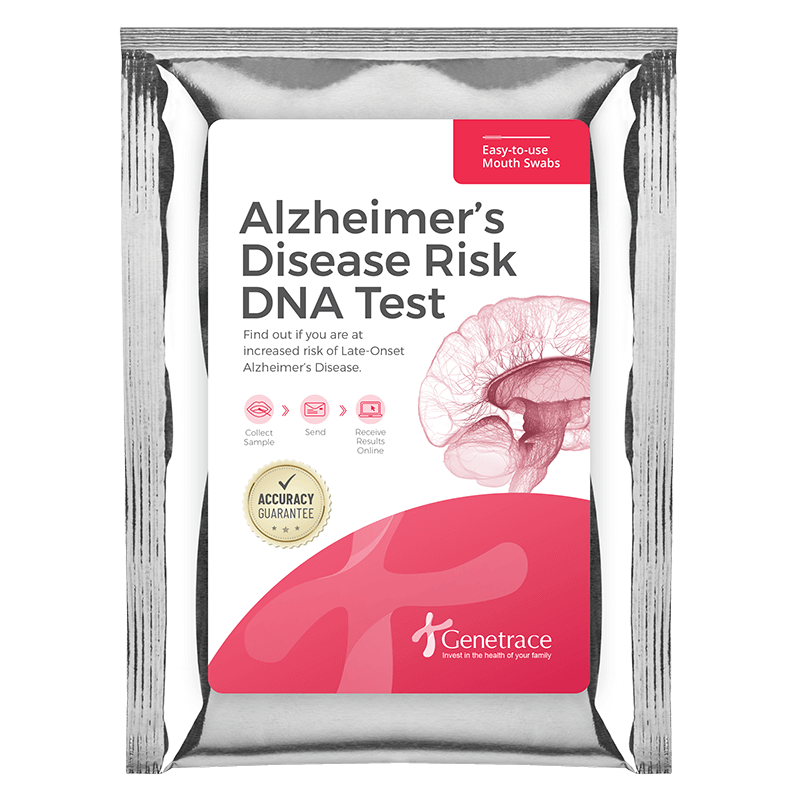About the Test
Frequently Asked Questions

Find out if you are at risk - get tested
| Test Type | Testing Time | Fee |
|---|---|---|
 DNA Alzheimer's Disease Test
DNA Alzheimer's Disease Test
| 4 to 6 weeks |
$195
Click Here to Order Kit |
All orders received before 3pm PST / 6pm EST are shipped out the same business day. All orders received after 3pm PST / 6pm EST or on weekends or holidays are shipped out the following business day. 24/7 online status check and account management available for all tests.
People without the APOE e4 genotype can still develop Alzheimer’s disease. APOE e4 is associated with a 3- to 15-fold increased risk of developing late-onset Alzheimer’s disease compared to individuals without the APOE e4 genotype.
No, not everyone who carries the APOE e4 genotype will eventually develop late-onset Alzheimer’s disease. Individuals who have the APOE e4 allele have a 3- to 15-fold increased lifetime risk of developing late-onset Alzheimer’s disease.
After genetic testing, there are six possible outcomes: e2/e2, e2/e3, e2/e4, e3/e3, e3/e4, e4/e4 APOE e2: The presence of an APOE e2 allele may provide some protection against Alzheimer’s disease. APOE e3: The APOE e3 allele is the most common allele and is a neutral allele, meaning there is no increased or decreased risk with the presence of this allele. APOE e4: The APOE e4 allele is linked to an increased risk of developing Alzheimer’s disease at potentially a younger age of onset. If a person has one APOE e4 allele, they have a three-fold increased risk of developing Alzheimer’s. Individuals that carry two APOE e4 alleles have 10 – 15 times the normal risk of developing Alzheimer’s.
Testing begins immediately once the samples arrive at the laboratory and is completed within 3 to 5 business days.
The APOE e4 allele is found in the majority of patients with Alzheimer’s disease. An individual who has tested positive for the APOE e4 allele has a 3- to 15-fold increased risk of eventually developing late-onset Alzheimer’s disease. However, since not all individuals who have the APOE e4 eventually develop the disease, the presence of the APOE e4 allele is not by itself diagnostic of late-onset Alzheimer’s disease in a symptomatic individual.
Individuals who test positive for one copy of the APOE e4 allele have 3X increased risk of developing late-onset Alzheimer’s disease compared to an individual who has tested negative for APOE e4. Individuals who test positive for two copies of the APOE e4 allele have a 10 – 15X increased risk of developing late-onset Alzheimer’s disease compared to an individual who has tested negative for APOE e4.
The APOE gene is associated with the risk of developing late-onset Alzheimer’s disease. The APOE gene is not associated with early-onset Alzheimer’s disease.
The APOE gene encodes Apolipoprotein E (ApoE). ApoE is essential for packaging and carrying cholesterol and fats through the bloodstream. There are three common alleles of the APOE gene: APOE e2, APOE e3 and APOE e4. APOE e4 is the strongest known genetic risk factor for Alzheimer’s, while APOE e3 is the most common allele, and APOE e2 appears to have a neuroprotective effect against Alzheimer’s.
There are two general types of Alzheimer’s disease, which are basically similar in the effect and progression of the disease, apart from the difference in genetic causes and the age of onset. The two different types of Alzheimer’s disease are Early-Onset Familial Alzheimer’s Disease and Late-Onset Alzheimer’s Disease.
The prevalence of dementia and, in particular, Alzheimer’s increases with age with an estimated 25 – 45% of persons over 85 years suffering from some form of dementia.
The lifetime risk of getting Alzheimer’s is estimated at 10 – 12% and for those individuals who have a family member with late-onset dementia; the risk increases to 15 – 30%.
You can choose to receive your results report by mail, email or both. The test includes one copy of the results by mail and one copy by email at no charge. The results report is issued immediately once the testing is completed.
The DNA collection kits can be shipped to any country in the world.
No, there is no age limit for testing. The test can be performed on individuals at any age, even newborns. If the patient is a minor, the legal guardian must sign the DNA testing consent form. The sample is collected easily and discretely using buccal swabs.
The DNA testing kit does not have an expiration date, so you can use the kit at any time. However, once the sample is collected, the samples must be sent back for testing within 3 weeks of the sample collection.
Yes, your results are 100% confidential. No one will be able to access your account or your results unless you give them your confidential account login. You can change the password to your account at any time. Please remember to safeguard your login information and not share it with anyone.
